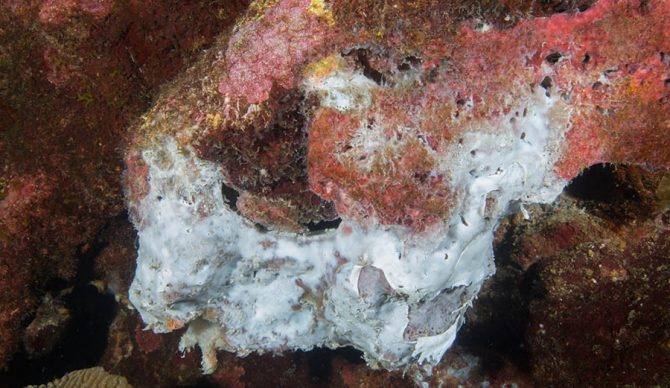
The East Flower Garden Bank reef.
The National Oceanic and Atmospheric Administration (NOAA) has reported thousands of marine organisms are dying in the East Flower Garden Bank in the Gulf of Mexico. What has the NOAA puzzled is that it’s happening with no apparent cause.
The report first came from a group of sport divers who noticed “green, hazy water, huge patches of ugly white mats coating corals and sponges, and dead animals.” The East Flower Garden Bank, as its name suggests, is normally a colorful and lively reef. It looks as if a flower garden has been submerged into the sea.
The scariest part of this occurrence is not merely the massive loss of an already depleted marine eco-system, but that no single cause has been determined. This is, in part, because a number of different species within the reef system are dying, as opposed to just one specific coral or invertebrate. It is reported that there are “unprecedented numbers of dying corals, sponges, sea urchins, brittle stars, clams and other invertebrates on large but separate patches of the reef.”
Is there some sort of sea-plague scientists are unaware of?
The investigation is ongoing, but marine experts are currently pointing to a number of different issues. They suggest that it is most likely a combination of causes, not just one big spill or environmental shift. The sanctuary superintendent G.P. Schmal said, “We know of no spills that have recently occurred near the Flower Garden Banks,” “but water temperature over the banks is quite high, at 86 degrees.”

The current state of the sanctuary.
Without a clear, definitive spill or pathogen to point to, it seems likely that rising global sea temperatures are to blame for the rapid, unprecedented death in the reef.
Coral reefs foster incredible amounts of biodiversity within the marine ecosystems and beyond. The mass extinction of reefs that has occurred in the Anthropocene thus far has already had an impact on the environment will have an impact on human life very soon.
With more and more instances of ambiguous loss of life in reefs, it would be wise for humanity to start to analyze its actions and the repercussions of these actions much more closely.

